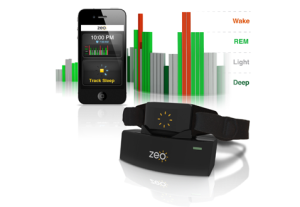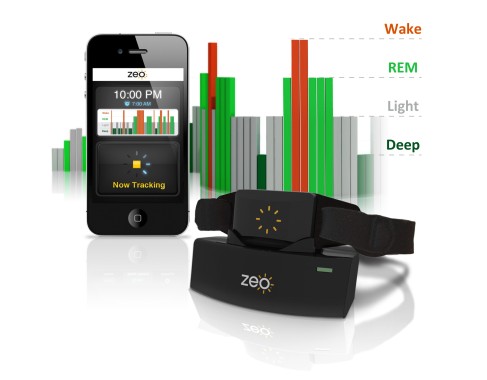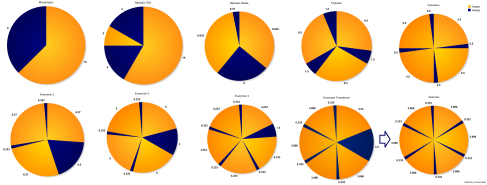Posts Tagged ‘zeo’
I’m declaring a new class of applications – hostageware.
Apps that you HAVE to use because there is no valid / realistic alternative but which are SO buggy and such crap that they drive you insane.
The Zeo is the archetype.
The Zeo has a myriad of problems which seem too numerous to enumerate in one blog post.
Regardless, I’ll try to name a few.
From a platform perspective, they’ve pushed the concept of the ‘ZQ’ to explain how solid your sleep was from the night before.
However, it’s a JOKE metric.
For example, my Zeo told me I had a ZQ of 61 and that I slept 5:26 minutes.
The previous night my Zeo told me I had a ZQ of 82.
Now I’ve been controlling my sleep TIGHTLY for the last week and I can tell you that LAST NIGHTs sleep was MUCH better than the previous night.
Why? Because I was training the previous day and had a lot of recovery to catch up on. All of my subjective measures (morning, mid, and evening wakefulness and creativity) were high and my performance was exemplary.
Getting LESS sleep and more efficient sleep is a GOOD thing and not a bad thing.
It’s been YEARS since this problem was exposed. This should have been corrected in version 1.1. Have they fixed it yet?
Nope.
Another example. Last night I Slept from 12:08AM until 6:50 AM. As printed on my Zeo and recorded by me before and after I slept.
Guess how many hours the Zeo says I slept. It thinks I only slept 5:26 minutes. Major discrepancy.
I’ve asked Zeo 3-4 times for an explanation here and I keep getting conflicting answers.
The only conclusion I have is that NO ONE within Zeo actually uses their product.
One could come to the conclusion that it’s the sleep version of a lie detector (AKA snake oil) and that I’m just observing placebo effect.
However, in my experience, the deep and REM measurements are somewhat accurate and valuable to my sleep hacking.
Every time the Zeo tells me that my REM and deep numbers are off, I notice correlated mid-day sleep pressure / drowsiness (which impacts my work).
So for now I’m stuck, trapped. Zeo is keeping me a hostage.
I’d drop them in a MINUTE if there was a viable alternative.
Update: Another good example of the use of the Zeo is the ‘time to Z’ which is the amount of time it took you to all asleep. As part of my hacking I have dramatically lowered my time to Z measure. Which is great, but it’s not 1 minute which is what it suggested last night. I was definitely mellow last night but I would say it was more like 5 minutes. It’s just hard for Zeo to be very reliable with one EEG sensor but then again they shouldn’t sell their product as BEING reliable.
In the past I’ve been critical of the Zeo. I found it was an expensive toy with no REAL use in the real world.
The problem is that the previous device required you to manually upload the data EVERY NIGHT and in my mind for biohacking this type of recurring manual intervention becomes annoying VERY quickly.
The Zeo Mobile does away with this though. You just start it on your phone and off it goes.
All your data is on your smart phone and in the cloud.
The cool thing is that I can wake up the next morning and determine if I need to go back asleep or not based on how much REM and deep sleep I’ve had the night before.
In my experience if I do not train the night before I need 1 hour of deep and 2 hours of REM.
If train the day before I usually need about 1:20 of deep and 2:30 of REM. Which translate to about 9 hours of sleep.
The problem is that I CAN accidentally wake up too soon and FEEL fine in the AM … but come around 2-3 PM I can crash hard.
The new Zeo has been a real win in this regard for me and I’m sticking to it religiously now.
Check out this awesome polyphasic sleep info graphic from the guys at trypolyphasic.
After I get done this cut and get down to about 165, I am going to try to maintain my weight and bulk up for about another month and get a new baseline on my health.
Then I’m going to try polyphasic.
I think I can do the “biphasic siesta” method pretty easily. In past experiments it seems that my body NATURALLY wants to do this but I wasn’t very good at napping.
I think if I practice napping I can get better at it … but right now it takes me a long time to nap.
Also now that I have the Zeo mobile I can take it into work or just have two versions.
Having the data is valuable.
The weird thing is that sometimes when I lay down I find that the Zeo SAYS I was in REM briefly but I don’t feel like I actually slept.
The Adderall seems to cause me to become startled just as I’m about to fall asleep.
I’m going to try to phase off the Adderall as not being able to nap is causing problems and less efficiency which is counterproductive.
I really hate it when mainstream media covers lame science.
This study recently done at the University of Pennsylvania is interesting but not really helpful.
For starters. It was VERY small…. dozens of subjects:
In what was the longest sleep-restriction study of its kind, Dinges and his lead author, Hans Van Dongen, assigned dozens of subjects to three different groups for their 2003 study: some slept four hours, others six hours and others, for the lucky control group, eight hours — for two weeks in the lab.
This is the longest study of its kind? For two weeks? I’m confused.
Then there is this infographic:

What was the source of this data? Self reported? I don’t even know where to being with the flaws with self reported assessment.
Not surprisingly, those who had eight hours of sleep hardly had any attention lapses and no cognitive declines over the 14 days of the study. What was interesting was that those in the four- and six-hour groups had P.V.T. results that declined steadily with almost each passing day.
So subjects that needed 8 hours of sleep performed poorly when constrained to less hours of sleep? And we’re surprised by these findings?
And of course the NY Times doesn’t link to the actual study nor does it appear that the study is online from a Google search.
Part of the problem is that research community still doesn’t publish online.
However, when the NY Times publishes articles with such poor quality I’m not exactly encouraged to pay for articles of such low quality.
Also, why are they writing a story about a study done in 2003? That’s 8 years ago!
The biggest problem I have with this article is that the core idea of sleep optimization is to get the same quality of life with but with less sleep.
Telling people to just cold turkey start sleeping less isn’t going to have reasonable results.
You might as well tell random people to start running a marathon and then act surprised when they hurt themselves.
I have some initial conclusions from my ~2 weeks of sleep experiments.
– A pitch black room does increase my perceived sleep quality. I remember my dreams more and seem to have more dreams in general.
– The blue blocker sunglasses don’t seem to yield any meaningful result for me. This might be because of my current level of caffeine.
– Sleeping alone doesn’t seem to impact my quality of sleep either way.
– Sleeping with the Zeo itself interrupts my sleep. A bit of a heisenbug …
– Measuring my heart rate while I sleep also interrupts my sleep. However, it yielded some interesting results. While I sleep, I can see 3-5 peaks where my heart rate will temporarily jump from 43bpm to 75bpm… I assume these coincided with REM dreaming. I can’t get my heart rate monitor and the Zeo to sync up without exporting the data and re-importing it into a new system.
Here’s a run from while I was sleeping the other night.
I can’t perform extensive analysis on this just yet as I haven’t exported all the points.

My next big change is to quit caffeine again (I’m down to only 30mg) and then try to sleep without caffeine and wake up when I feel rested. I think I can migrate to bi-phasic sleep where I have a 5-6 hour core and then a 20 minute nap in the afternoon.
Part of this is confused by my rigorous athletic training which requires sleep for recovery.
This is my 3rd day sleeping in an environment which is 100% pitch black with no interruptions (no sound).
My bike rides have seen a marked improvement in their subjective ride quality. I also feel a bit more rested in the afternoons.
What’s more amazing are that my dreams are now amazingly vivid!
For the last three nights I’ve had very profound dreams. These really were inspiring and I found myself thinking about them well into the afternoon.
I haven’t dreamt like this in years!
If this continues, I’m going to restart the habit of keeping a dream journal (perhaps via audio).
Additionally, my rides have been improving. My subjective ride quality on my morning 15 mile ride was about an 8 out of 10 … which is really good as lately I’ve felt I’ve been overtraining.
I hypothesize that the quality of REM is significantly improving which explains the vibrant dreams and also explains the aided recovery in my fitness.
I was able to experiment with this by not replacing my blinds but instead just taping black trash bags over the window. It’s not pretty and only temporary. I’ll buy more expensive blinds in the future but this was a cheap $20 experiment.
I also found that I wasn’t able to fully black out the whole room and there are some spots which let in some mild light in the morning. Interestingly, the last 2 days I woke up just after sunrise so I think if I make sure no light is let in EVEN during sunrise then I can further optimize my sleep experience.
So far this has been full of WIN. Very excited to see what happens over the next few weeks.
My initial goals were to sleep less total hours but I’ll settle for this as it will also have a significant impact on my quality of life.
Another quick thought. The Zeo has turned out to be of no help. My ZQ scores are the same if not lower. On Sunday night I woke up 5 times. The Zeo says I only woke up once. My current thinking about the Zeo is that it’s an expensive pseudoscientific toy… Even gradual wake up function hasn’t helped me.












